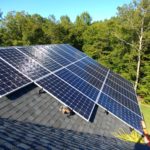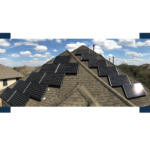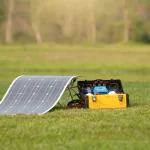Last Updated on March 4, 2024 by admin
Homeowners in the U.S. are now widely using solar energy for financial and environmental reasons. It provides long-term electricity cost reductions, making solar a worthwhile investment in addition to being clean and enviro-friendly. But when the power goes out, how homeowners can use solar panels during power outages?
In this article, we will suggest some solutions for homeowners so that they can use their solar panels during power outages.
Check out the Estimated Solar Cost of your home INSTANTLY!
Its 100% FREE
You can have a quick idea about the cost of switching to solar
Our Energy professionals are one call away for advice
Important Points To Remember:
- The working of solar panels during power outages depends on whether your system is equipped with a battery backup system
- The best and most efficient approach to power your house during a blackout is to choose solar battery storage.
- Solar batteries provide with a more dependable and secure alternative to power your home than backup generators.
- Solar + Battery Storage is a perfect combination to become grid independent.
What is in this article?
- How Does Solar Work during a Blackout?
- What is the Difference Between Off-Grid and Grid-Tied Solar?
- How Does Battery Storage work during Power Outages?
- Why Should a Homeowner Need to Install a Battery Storage System?
- Do I Need an Inverter for the Solar Panels during Power Outages?
- How to Use Solar Panels During Power Outages?
- Solar Battery Vs Generator: Which one is best for a home in an Outage?
- How Many Solar Panels Do You Need to Power a House?
- Why solar + battery storage is important than ever during power outages?
How Does Solar Work during a Blackout?
Solar PV system requires sunlight to produce free electricity for your home. You may think that solar homeowners are not impacted by a power outage during the day. But, this is typically not the case. You will lose power when all of their other customers do if you depend on your power grid.
In a blackout, your system is shutdowns automatically to avoid supplying power. This is a safety measure for the utility employees repairing downed power lines.
Although, Solar panels do not supply electricity during scheduled or unplanned shutdowns without additional assistance. However, there are solutions to this issue: Alternately, switch to an off-grid system or install backup solar batteries.
What is the Difference Between Off-Grid and Grid-Tied Solar?
There are two ways to install a solar energy system: on and off the grid. The majority of systems are grid-tied as they are connected to an electric grid. This configuration enables you to use the grid’s electricity when your house is not producing enough, such as at night or on cloudy days.
Moreover, a grid-tied solar system also enables you to supply any extra electricity to the power grid. The local power company will then give you a credit, which will lower your electricity bills thanks to net metering.
On the other hand, an off-grid solar system has no connection to the electrical grid. You won’t be affected by outages because your solar energy system is your only source of electricity. Off-grid systems typically include generators or solar batteries to meet their power needs. The high initial expense of getting off the grid is a considerable drawback.
How Does Battery Storage work during Power Outages?
Consider solar backup battery storage if you want to know the most cost-effective approach to using solar panels during power outages.
Solar energy storage systems gather energy from the panels and keep any additional power in batteries. During outages, you can utilize the solar battery to:
- Power up your home
- Energise portable devices
- Keep the essential appliances running
- Power up medical equipment
The storage capacity of your battery determines how long it lasts. Given conservative energy use, the higher it is, the longer you can survive an outage. Apps that let you view real-time usage are available for most solar batteries.
Why Should a Homeowner Need to Install a Battery Storage System?
The majority of homeowners use electricity from the electrical grid to supplement solar power. However, solar+battery can supply power regardless of the time of day or the weather without the need for backup power from the grid. The advantages of a solar-plus-storage system are as follows:
Power availability round the clock:
If you don’t have a solar energy system and use the time-of-use utility billing system, the higher demand on the system during the evening hours will probably result in higher electricity costs. However, with battery storage, you can use the electricity throughout the day at a later time. You don’t need to rely on the utility for power. If you are in a region where power outages are regular, this is very helpful.
Protecting Your Pocketbook:
With a battery, you can prevent an increase in electricity rates from your utility. Battery storage enables you to make use of affordable electricity that has already been produced and stored. This ensures that your rates remain low and have no impact on your monthly spending plan. In rare circumstances, you may even be able to sell the energy back to the grid when prices are higher.
Improved Tracking:
Through monitoring tools, a solar-plus-storage system can assist you in more accurately and transparently tracking the energy your system is producing. You can monitor the energy your home is using and producing in real time with the help of these solutions.
Energy Independence:
A solar-plus-storage system gets you closer to being “off the grid” even though many states demand homeowners have a connection to their local utility even if they don’t use any electricity from the utility. With battery storage, you can prevent depending on your utility company for most of the year to provide electricity to your home. Additionally, you may always save some battery power so that your home will have lights in blackouts in the area.
Do I Need an Inverter for the Solar Panels during Power Outages?
You will require a solar inverter if you plan to use your solar panels during power outages as a backup solution. Your solar panels provide electricity to the system while you utilize power from the grid. However, you require an inverter to take power straight from your home’s solar power system.
In case of a grid down, for experts to safely work on the downed lines, your utility company needs it to be powerless. An inverter and backup solar batteries are required to convert the direct current (DC) power from the solar panels into the alternating current (AC) power utilized in your home.
How to Use Solar Panels During Power Outages?
You can utilize solar energy during a power outage once you have the best backup battery system. The processes for attaining this will differ. It will depend on how your solar power system is set up, including the kind of inverter you have, but here is an example:
- To disconnect your system from the grid, press the switch. This will be in your main breaker box or close by.
- Put the solar power breakers in the on position by finding them in or close to the main breaker box.
- Your inverter may require some time to charge completely and be ready.
- Your system will get operational.
- While using the system, keep an eye on your battery life and power consumption to assist you manage usage.
Battery Storage is the Best Option during Power Outages
Although you have other options, a solar power battery storage system is the best choice for supplying power to your house during a power outage. Solar is a smart choice if you have not any requirements by an HOA or other considerations.
Backup generators typically run on petrol or diesel and have a limited capacity. Long-term storage of unnecessary fuel in a generator can lead to instability and harm to your system
Solar Battery Vs Generator: Which one is best for a home in an Outage?
For most homeowners, selecting between a generator vs battery, cost is a key consideration. If on the one hand, different generator types are generally less expensive and simple to size for home demand.
On the other hand, a battery storage backup has a lot of benefits. A battery and solar panel combination reduces the electricity bill. A solar battery also offers a quiet, renewable power option that a generator would not. Additionally, consumers now prefer solar battery backup over generators for lighting their homes during outages due to the solar battery’s continually decreasing cost.
How Many Solar Panels Do You Need to Power a House?
A typical home needs between 17 and 21 solar panels to generate all of the electricity it utilizes. You’ll need to know your annual electricity usage, the wattage of the solar panels you’re thinking about, and the expected production ratio of your solar system to calculate how many solar panels you’ll need. You can calculate the number of solar panels you’ll require by dividing the system size by the production ratio and then by the panel wattage once again.
Moreover, The exact number of panels you’ll need to install will depend on a variety of elements, such as your location, the efficiency of the panels, their rated power, and your energy usage patterns. Importantly, the cost of solar is directly impacted by the amount of solar panels you require for your home.
Why solar + battery storage is important than ever during power outages?
In the United States, millions of people got affected in the way of severe storms, wildfires, and heat waves by power outages and blackouts. On the East Coast, strong winds of 60 mph knocked over 4,000 power lines and cut power to more than 1 million consumers. Utility companies on the West Coast cut off electricity to hundreds of thousands of homes due to a raging fire in California.
In such circumstances, a great way to take charge of your home’s energy is with solar panels. It is the cause of the 35-fold increase in solar energy’s current capacity, which is projected to be 62.5 GW. This would supply electricity to around 12 million typical American homes. Additionally, Wood Mackenzie anticipates a doubling of solar installations by 2023.
Also, Due to the decreasing stability of the electric grid, homeowners are increasingly choosing solar energy over fossil fuels. People are beginning to “lose confidence in their electrical system and take these essential actions towards creating something like energy security for themselves.
Overall, The reason is that natural disasters are occurring more frequently than ever before, and the outdated electrical grid is causing more power outages than ever before.
Key Takeaways
If you are curious about the working of solar panels during power outages, it depends on whether your system is equipped with a battery backup system. It’s important to understand that you can utilize solar panels even when there is a power outage.
It’s also essential to be aware that the best and most efficient approach to power your house during a blackout is to choose solar battery storage. Solar batteries provide you with a more dependable and secure alternative to power your home than backup generators.
You can also ask the best solar installer near you for suitable solar + battery storage options for your home.





